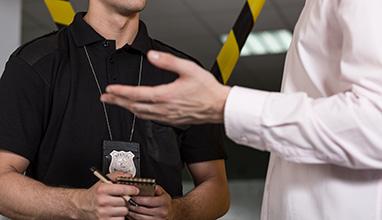Knowledge of the law and criminal behavior is important for those who wish to become probation officers. Extensive training into these subjects is given at the college level in order to prepare workers to enter this career field.
Core High School Classes
Any class that helps develop writing skills should be taken by high school students who would like to become probation officers. A few recommended classes include English, social studies and literature. Since probation officers are often responsible for financial recordkeeping, courses in math and accounting can also be beneficial. Government and civics courses can provide them with an overview of the Constitution, and knowledge of this document is essential for anyone working in this career field.
Associate’s Degree: Corrections or Criminal Justice
Community or technical colleges often offer degrees in corrections or criminal justice, and both majors can be useful for those wishing to become probation officers. Some courses that might be taken include an introduction to criminal justice, criminal law and juvenile delinquency. While taking these classes, students may be asked to write several essays in order to prepare them for creating reports later. The cost of this degree can be between $11,050 and $14,590 per year, and books can cost as much as $2,340 overall.
Bachelor of Science: Law Enforcement Major
A Bachelor’s degree in criminal justice normally allows students to specialize in certain areas, and one of them is probation. Some of the courses required by this probation officer education could include victimology, rehabilitation, sociology and principles of probation and parole. Courses can be taken in a traditional classroom setting, online, or via a combination of the two. The cost of obtaining this degree ranges from $14,200 to $17,400 annually. Fees could cost between $800 and $1,600 per year, with books adding another $1,200 to that cost annually.
Mandatory Training
Probation officer training is mandatory upon being hired. A training program typically lasts between two and four weeks, and deals primarily with local laws concerning probation and parole. Other things that may be taught include self-defense techniques,sex offender management and drug abuse awareness. A written exam is administered at the end of the training program, and passing this exam is mandatory. There is no cost for this training, and officers are paid for their attendance. The pay can be between $14.85 and $30.00 per hour depending on the geographical area.
Continuing Education
Most states require probation officers to undergo a certain number of continuing education hours each year in order to remain employed. This education will focus on ethics, but also provide up-to-date information on changes to the law. This training is typically conducted at a law enforcement training facility, and is provided free-of-charge to active probation officers. The government agencies that hire probation officers are typically responsible for organizing training programs and tracking officer attendance.
Some aspects of a probation officer’s line of work are developed through practical experience rather than classroom training. This means that learning is an ongoing process for anyone who is employed in this line of work.






